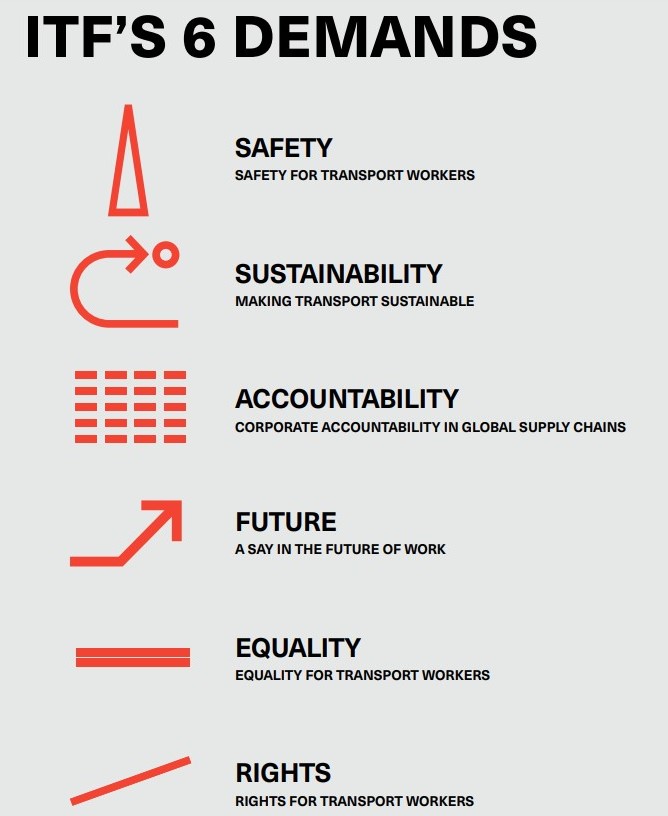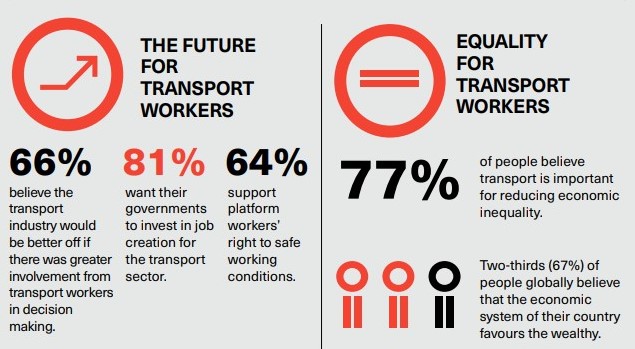The International Transport Workers Federation (ITF) and YouGov carried out a poll of 16,464 people, finding out that 85% are supporting robust workplace protection for transport workers working across borders or in international waters/airspace.
YouGov surveyed people in 15 countries. Key headlines include:
- 81% of people say that that they support laws that hold companies to account for environmental and labour rights abuses in their supply chains.
- 44% of people believe that transport companies behave in a way that is not ethical. This places transport companies as the second most likely to be considered ‘not ethical’, only behind energy companies (52%).
- 81% of people globally – or more than three in every four – believe that the world’s economy is reliant on transport workers for the movement of goods and people.
Most specifically, the COVID-19 crew change crisis, that kept 400,000 seafarers stranded on ships and cut off from their families, sometimes for years, exposed shortfalls in the system that maintain good working conditions for this crucial global workforce.
Public opinion is clear that governments and stakeholders must make this a priority
ITF said.
The data, broken down regionally, shows public support for transport workers having protection regardless of where they work holds across the globe.
Latin America (89%), APAC (88%) and Africa (87%) were the most likely to think it was important transport workers have protections regardless of where they work, with support following closely in the G20 (85%), North America (82%) and Europe (81%).
Reacting to the findings, Stephen Cotton, general secretary of the International Transport Workers’ Federation, commented:
Seafarers are the backbone of the global economy. Each day, we wake up to food in our fridges and fuel in our cars because of their unwavering dedication to their trade. But their working protections are being eroded, ironically making it harder for transport workers to purchase the very goods they help move
He further added that “global governments convening at the ILO-IMO Tripartite in Geneva must recognise the will of people around the world and use this moment to improve protections for seafarers.”

Action plan for governments and investors
The call for greater investment in transport policies is clear, and none is louder than for those policies which protect transport workers themselves. Almost nine in every ten people support their government implementing policies to protect transport workers from violence and harassment (87%) and laws which improve health and safety (85%). A further 80% would like to see their government implement policies that end abuse of transport workers in supply chains, while 83% want their government to protect transport workers’ employment rights.
In addition to calling for policies that protect transport workers, people globally also want to see greater investment in the transport sector itself, with 75% calling for increased investment in all transport and 83% calling for increased access to transport.
The global climate crisis is also at the forefront of people’s minds. 79% of people are calling for their governments to put in place plans to lower emissions in the transport sector while also calling for increased investment in sustainable transport (80%).
Transport workers keep the world moving
66% of people – or almost two-thirds – believe working in transport is a respected profession, while 62% believe it is an attractive career for young people (something that 63% of young workers themselves agreed with). Slightly less – but still a majority at 54% – believe transport is an attractive career for women.
People also believe that transport workers have valuable knowledge and experience that should be utilised, with two-thirds (66%) of people believing the industry would be better off if there was greater involvement from transport workers in decision-making. 35% of these – or more than one in every three people – believe the industry would be much better off.
This view is particularly prominent amongst young workers, with 71% of them believing that the transport industry would be better off if there was greater involvement from transport workers in decision-making.
Despite its reputation as a respected profession, many people believe more should be done to protect some of the transport industries most vulnerably workers, namely those who earn their living via platform employers such as Uber, Ola, Lyft, Grab or Deliveroo. More than half of people believe these ‘platform workers’ should have the right to safe working conditions (64%), access to social protections such as healthcare (60%) and should be provided a minimum wage upon which they can live (57%). Many people would like to see these provisions extended to labour rights such as the right to join a union (43%).

Labour laws and social protection for transport workers
The populations included in this poll strongly support labour rights for transport workers, and in particular those laws that protect workers’ health and safety (87%) and ensure a decent minimum wage (85%).
They also support the right to unionise and take action as a collective; 80% support laws that give workers the right to collectively bargain, and 75% want laws that provide the right to join a union. More than two-thirds (67%) support there being laws that protect the right to strike.
They also strongly support transport workers being provided with basic social protections such as affordable access to healthcare (86%) and education (84%), as well as unemployment benefits (81%). People also strongly support their government implementing policies to protect transport workers at vulnerable times in their life, such as providing decent retirement incomes (85%) and support for paid maternity leave (84%).
This support flows through to the role of transport unions themselves, with 68% of people believing it is important that transport unions play an active role in society. Of these, one in three (33%) believe it is very important.






























































